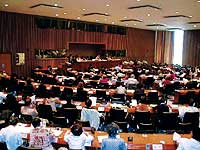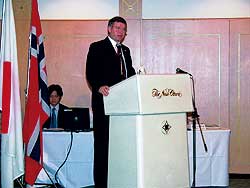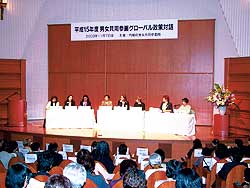![]()
Consideration of Japan's Periodic Reports on Implementation of the Convention on the Elimination of All Forms of Discrimination against Women
|
On July 8, 2003, the Committee on the Elimination of Discrimination Against Women (CEDAW) considered Japan's 4th and 5th periodic reports on its implementation of the Convention on the Elimination of All Forms of Discrimination against Women at its 29th session. The Japanese government sent its delegation consisting of 15 government officials from the Cabinet Office, National Police Agency, Ministry of Foreign Affairs, Ministry of Education, Culture, Sports, Science and Technology, Ministry of Health, Labour and Welfare, Ministry of Agriculture, Forestry and Fisheries. About 60 NGO representatives observed the consideraton and the Committee appreciated the high level of interest of Japan's civil society. |
 Consideration of Japan's Reports in the 29th session of CEDAW |
Based on the consideration, the Committee later released its concluding comments. In the concluding comments, while appreciating the reinforcement of national machinery and the improvement of the legislation in recent years, the committee recommends further measures to change sereotyped perceptions of gender roles and to increase the representation of women in decision-making level.
Norway-Japan Joint Symposium on "Future Strategies toward Gender Equality"
|
On May 26th 2003, the Cabinet Office held the Norway-Japan Joint Symposium on "Future Strategies toward Gender Equality", taking the opportunity of Royal Norwegian Prime Minister Kjell Magne Bondevik's visit to Japan. This symposium had two parts. Part I started with opening remarks by Prime Minister Bondevik. Then Japan's Chief Cabinet Secretary Yasuo Fukuda delivered his keynote speech, reporting Japan's situation on gender equality. He also stated his determination, "We will ‘press the accelerator' toward achieving gender equality in Japan, and we will never use the brake." |
 Norwegian Prime Minister Bondevik gives his opening remarks at the Norway-Japan Joint Symposium. |
Ms. Laila Davoy Royal, Norwegian Minister of Children and Family Affairs, also delivered a keynote speech, reporting past and present situations surrounding Norway's gender equality, and it's progress. She explained "We had undergone lots of suffering before Norway's GEM (Gender Empowerment Measure) reached the highest in the world. It was not an easy task for us, but recently even Norwegian men have come to call for longer child-care leave for husbands."
Part II of the symposium had a panel discussion on two themes: "Reconciliation of Work and Family Life" and "Gender Equality in the Workplace and in the Board Room."
For the first theme panelists discussed the Japanese government's supportive measures, some issues in balancing between work and family life, and Norway's efforts to establish proper environments for childcare as well as how much private company understand childcare. Norwegian panelist stated that fathers' quota encouraged fathers' participation in childcare. Panelists also discussed that fathers' participation in childcare would encourage women's participation in the workplace and that organizations should regard it as a long-term investment because it will promote more effective use of their human resources.
For the second theme the panelists pointed out the necessity to review inefficient work practices and alter the philosophy of business managers who tend to highly evaluate hard-working employees at the expense of their family life. The panelists also agreed that it is necessary to intentionally foster female workers who will take future leadership positions.
Policy Dialogue on Gender Equality 2003
Aiming at promoting the formation of a gender-equal society from a global perspective, the Cabinet Office held the symposium "Policy Dialogue on Gender Equality 2003" by inviting gender equality experts from countries that share common issues with Japan.
- Tokyo Symposium
Approximately 190 participants attended the Tokyo Symposium on November 7 at the Center for the Advancement of Working Women (CAWW). At the beginning, Prof. Feride Acar, chairperson of the United Nations CEDAW (the Committee on the Elimination of Discrimination against Women) delivered her keynote speech, explaining the contents of the Convention on the Elimination of All Forms of Discrimination against Women and roles of the Committee as well as presenting problems and actual cases in compliance with the Convention.
Among the multi-year program of work for the Commission on the Status of Women, the panel discussion covered the year 2004's themes: "The role of men and boys in achieving gender equality" and "Women's equal participation in conflict prevention, management and conflict resolution, and in post-conflict peace-building."

Policy Dialogue on Gender Equality 2003 in TokyoIn the first panel discussion panelists from Australia, Norway and Japan held discussions and pointed out the necessities of redefining men's role in their family by altering the traditional gender role concept: "Men should play leading roles at workplace and earn family budget."
In the second panel panelists from Afghanistan, the Office of the United Nations High Commissioner for Refugees and Japan discussed the present situations of Afghan women, female refugees' roles at refugee camps, their roles in post-war era, and the importance of women's contributions to the peace-building process.
- Okayama Symposium
On November 9, approximately 220 Okayama residents and other participants attended the Okayama Symposium.
After the keynote speech by CEDAW Chairperson Prof. Acar and four panelists, participants were divided into two separate meetings on the "Roles of men: Aiming towards gender equality founded on respect and cooperation" and "Conflict and women: Leaving poverty and violence behind."
Okayama prefecture governor Ms. Ohnishi attended the symposium as a coordinator and concluded that she understood the gaps between Okayama and the world as well as Japan's good and bad points, pointing out the importance of this type of dialogue among nations and organizations that share common issues.
